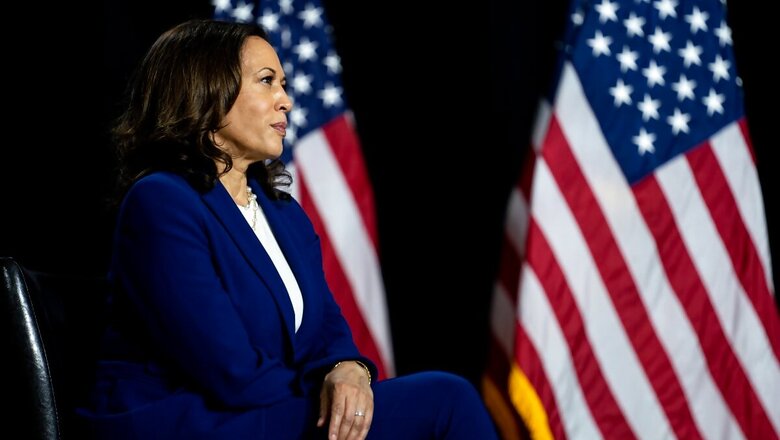
views
On the eve of India’s 74th Independence Day, an interesting and significant thing happened. US President Donald Trump launched an attack on Senator Kamala Harris, saying, “I have more Indians than she has.”
Now, at the outset it would be seen as an archetypal Trump-esque attack with not-so-subtle overtones of racial and ethnic prejudice, but, for a sizable section of Indian Americans, Trump may be right.
A deeper analysis of the Senator’s political standing presents a picture which doesn’t sit well with a section of Indian Americans, who are critical and holding back their enthusiasm. While the announcement of her being Joe Biden was cheered by Indian Americans, some do not see her as a trailblazer and an inspirational figure.
Rather, the biggest allegation that some groups have labelled against the Biden-Harris duo is that they have the support and backing of pro-Pakistan lobbies in the US, and therefore, are bound to work against the interest of India.
Ram Sastry, president of Voice of America and president of Hindus for America, was unambiguous when he said, “Biden/Harris is not a good choice for Indians. They are anti-India, Hindu phobic and pro-Pakistan.” Sastry even went further to prophecies that Biden has conceded the race to Trump by opting for Harris as a running mate.
Sastry’s views are gaining ground among some with a right-wing leaning. Dr Romesh Jhapra, a cardiac surgeon in San Francisco, dismissed the senator with Indian lineage as a ‘flip-flop politician’. “She’s moved too far to the left and supports ultra-socialist policies which are not liked by most of the American Hindus,” the doctor said. Dr Jhapra’s organization, Americans4Hindus, has already extended their support for the incumbent president.
Nisha Sharma, a Republican candidate for 11th Congressional District of California, accused Senator Harris of trying to play on people's emotions. “In the past, Kamala Harris has not only taken stance which go against India's interest or poke into internal matters like CAA or Kashmir, her policies are also against basic fabric of the US and against meritocracy. Indian-Americans are a smart group and they know action speaks more than the name,” Sharma said.
It will be wrong to solely pin the blame on the ideological moorings of the right-wing Hindu organisations and their members as opposed to a more liberal political milieu of the democrats. On many an occasion Harris herself has taken a posture that has concretised the perception that she is against New Delhi’s decision to dilute Article 370 of the Constitution, and if she comes to power, she is likely to take a strong stance against it by raising the issue of human rights violations.
Within weeks of Narendra Modi government ending the special status of Kashmir on August 5, 2019, Senator Harris along with other leaders of the Democratic Party met members of the Kashmiri diaspora represented by an outfit called Justice For Kashmir (JFK), an NGO. According to media reports, the aim of JFK is to raise awareness on ‘political incursions’ by India in Kashmir among the leading politicians, bureaucrats and intellectuals in the US. These meetings were arranged by Asif Mahmood, a democrat of Pakistani origin, whose stance regarding Kashmir is well documented. Mahmood himself has spoken to media outlets confirming that he did facilitate those meetings so that Kashmiris could get a platform to voice their concerns
A few months later, in December 2019, Harris vehemently criticised India’s foreign minister, S Jaishankar’s refusal to attend a meeting with Congress delegates as it included Pramila Jaypal. Jaypal had introduced a resolution on Kashmir urging India to lift restrictions. New Delhi had described the resolution as not being a ‘fair characteristic of what the government of India is doing.”
During her unsuccessful presidential campaign, when Harris was asked about the lockdown in Kashmir she had responded by saying, “It is about reminding people that they are not alone, that we are all watching,” leaving little doubt as to her stance. And this is what has caused heartburn among some Indian-Americans.
Dev Karlekar, from the Overseas Friends of BJP, didn’t mince his words while describing Harris’ candidature, “as Biden's campaign is largely influenced by Pakistani Caucus, they suggested Kamala Harris from a historically blue state California,” – referring to the colour associated with the Democratic Party.
Karlekar predicted that the move will further derail Biden’s campaign as a sizable section of Indian American voters have already moved towards the GOP. “She (Kamala Harris) has zero reputation whatsoever among Indian-American voters and her record with black community is also poor,” Karlekar added.
Somanjana Chatterjee, a political strategist and social commentator, was even more scathing on Harris’ relationship with the Indian-American community in California. “Living in CA for more than 10 years, I have never heard of Kamala mentioning her Indic roots up until her campaign fundraisers for Senate race. While serving as Attorney General of California, based in San Francisco, she was needlessly non-cooperative when approached for inputs in the state’s public school text books revision on Hinduism,” she said.
While Tulsi Gabbard, the first Hindu Congressman from Hawai, joined the Howdy Modi event, Harris was conspicuous by her absence. Though she has consistently spoken about the role her India-born mother played in bringing her up, politically she has identified with the African-American community rather than the Indian-American. No doubt, on the day of Kamala Harris’ announcement, Indians flooded the internet searching for her religion.
But, to be fair to the senator with Indian lineage, there’s considerable reason of not parading her Indian connection and seen as a community leader - whether it’s through her social media or during her political campaigns. In the past, Americans with ancestry in the subcontinent, have had to play down their ethnic heritage in order to be a successful politician. A case in point being Bobby Jindal, the Republican governor of the swing state of Louisiana, who, at a young age, changed his name from Piyush to Bobby and embraced Catholicism.
Others like Judhajit Senmazumdar, a Silicon Valley based technologist and founder of NRIs4Bengal, a US-based group to rally Bengalis in America, claimed that Karlekar, Sharma and Sastry’s sentiments are being echoed by many. According to him, many in the community are thinking of not getting swayed by Harris’ first name or her roots but will make an ‘informed choice’ whether to vote for the Democrats or Republicans based on her past actions and records.
It’s not Harris alone that the Indian-American community is worried about though. A policy paper, ‘Joe Biden’s Agenda for Muslim American Community’, created a furore when it was posted on his campaign website. The paper called out Citizenship Amendment Act (CAA) and National Register of Citizens (NRC) as inconsistent with India’s secular credentials.
Though it has been a long-standing characteristic of the Democrats to raise and be tough on human rights issues, Biden-Harris’ stance on Article 370, CAA and NRC has sown considerable doubts on the minds of some Indian-Americans, particularly supporters of PM Narendra Modi and those associated with BJP-RSS’ affiliated organisations.
Even in WhatsApp groups of US-based Indian-born techies, particularly those from the IITs, the doubts regarding the Democrats still persist despite a majority of them being liberals and supporters of the party due to its stance on the issue of immigration.
In numerous forwarded messages and personal opinions, the high-flying techies and entrepreneurs admit that “Trump has been incredibly pro-India” and his support is essential when the country is locked in a face-off with China. But they try to dispel the doubts by claiming that as a part of successful outreach by the Indian-American leadership, the US senate and Congress will “never choose Pakistan or China over India”.
On Biden’s Kashmir stance, during the run up to Democratic nomination, they have given a spin relating the move as a means to pacify Bernie Sanders’ supporters. The also cite the example of Biden being the vice-president when the civilian Nuclear deal with the US was signed but admit that the situation in Kashmir & India has considerably changed under Modi. The group is confident though that if the Democrats do occupy the Capitol Hill they will chart a new course and Kashmir won’t be an irritant.
So, if Biden-Harris duo defeats Trump-Pence in the November-3 election, will we see a reset in the Indo-US relation with Washington pressuring New Delhi to lift ‘restrictions’ in Kashmir and questioning the ‘secular credentials’ of CAA and NRC?


















Comments
0 comment